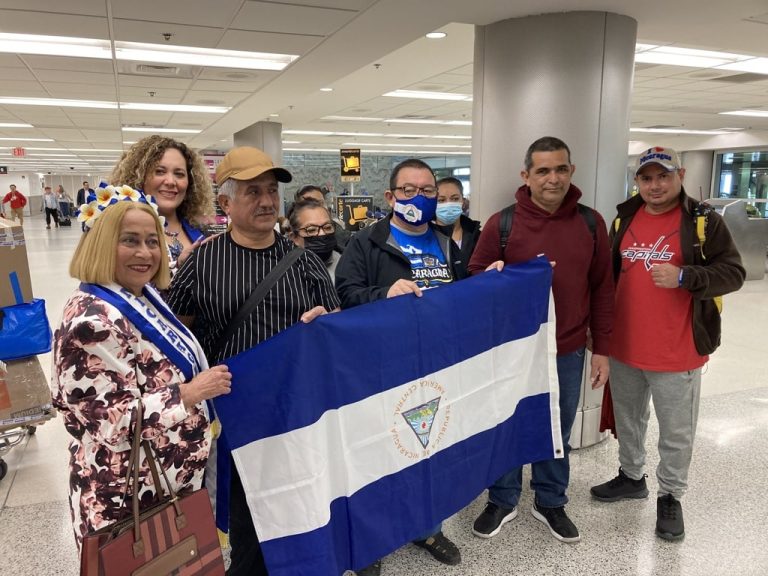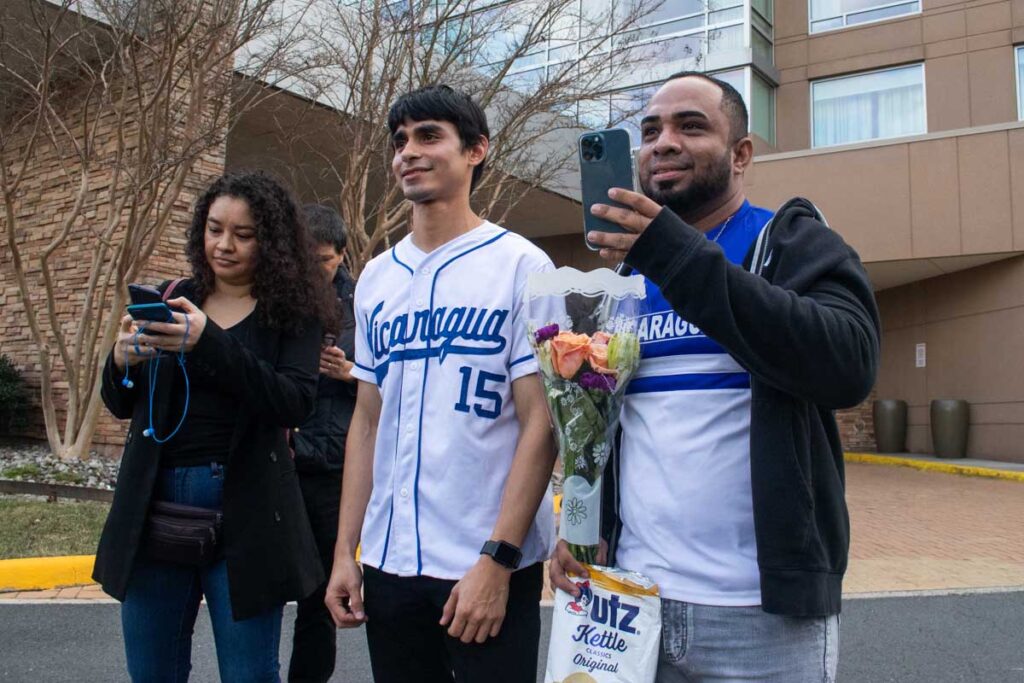
The Cuban Regime’s Punishment for Filming a Protest

PUBLICIDAD 1M
PUBLICIDAD 4D
PUBLICIDAD 5D
It’s not enough for governments to allow the entry of people in need of international protection. They must also grant them a immigration status

It’s not enough for governments to allow the entry of people in need of international protection. They must also grant them a immigration status
The Nicaraguan government headed by Daniel Ortega sent 222 formerly imprisoned dissidents into exile on February 9, at the same time that they stripped them of their nationality for supposed “treason to the homeland.”
In doing so, they utilized a courtroom verdict and a newly-minted “Special law to regulate the loss of Nicaraguan nationality” which was hastily rubber-stamped by the Nicaraguan National Assembly which is completely controlled by the regime. These measures will continue to be applied “with all vigor,” according to chamber one of the Managua Appeals Court.
This process allows the Ortega regime to threaten their citizens with loss of nationality, warns Venezuelan attorney Carlos Lusverti, a member of the executive board of Amnesty International’s Venezuelan chapter.
“Banishment or exile paired with the cancellation of nationality is a clear violation of the obligations established in the American Convention on Human Rights and the American Declaration of the Rights and Duties of Man,” states the human rights activist, “because it violates the right to enter and leave one’s own country. By arbitrarily depriving these people of their nationality, it leaves them stateless.”
Those considered “stateless” are people that no country claims as their citizen, the lawyer explains. It’s a violation that also affects the Venezuelan migrants, although for different reasons.
“Unlike Nicaragua, where they passed a law expressly intended to strip people of their nationality, in Venezuela what exists are de facto situations that leave Venezuelans in the situation of being without a homeland,” Lusverti clarified.
The attorney offered as an example the children of Venezuelans who were forced to leave the country as part of the forced migration and then faced difficulties in establishing their nationality.
Many migrants lose their documents during their journey and can’t apply for new ones because there’s no functioning consul or embassy in the country they’re in; or because these exist, but their services are deficient; or because the economic cost of the documents presents an obstacle.
Following 2019 and the international refusal to recognize Nicolas Maduro as Venezuela’s legitimate president, a number of governments broke off diplomatic relations and closed their consulates, a fact that affected the rights of the migrants. These services are only now being reestablished.
In some countries, being born within their borders isn’t sufficient to grant a foreigner nationality. Colombia, the principal destination of Venezuelan migrants, is a case in point. In order to broaden protection, the Colombian executive branch has dictated a special temporary measure granting Colombian nationality to those Venezuelan children who are stateless.
“Statelessness translates into a series of limitations for exercising rights such as health, education, civil rights such as marriage, the right to acquire property, to hold a job, etc., because they don’t have any recognized legal status,” Lusverti points out.
Although the absence of a define nationality shouldn’t affect human rights, in practice, “there are limitations. The systems that different countries have obligatorily set up to attend to human rights aren’t designed to deal with the situation of being stateless,” the specialist explains.
“When you go to register a child with an educational institution, they ask for your identity card. If the person doesn’t have an identity card, they’re expected to have a passport if they’re a foreigner. If they don’t have either of the two, that leaves the institution scurrying. Even when a school is able to admit those children as stateless, so they can receive an education, when they reach the end of their school career, they’re going to have problems getting their diploma.”
For those reasons, Attorney Lusverti stresses that it’s not enough for governments to allow the entry of people in need of international protection, but they must also grant them a recognized immigration status so that as they try to reconstruct their lives, they have access to some rights.
The United States received the 222 released Nicaraguan political prisoners and granted them humanitarian parole. That program will allow them to remain in the country for at least two years. However, this protective measure is different from asylum.
Despite the fact that this country in North America has taken in these former prisoners, it maintains in force a provision known as Title 42 which restricts the entry of migrants from Nicaragua, Venezuela and other Latin American countries where human rights violations have been confirmed and documented by organisms of the United Nations.
“Amnesty International has expressed its formal concern for the migration situation resulting from the application of Title 42. Applying this restrictive norm could effectively impede these 222 people from officially receiving asylum. The organization officially called on U.S. authorities to make the norms more flexible,” Lusverti expressed.

Nicaragua banished 222 released political prisoners to the United States. Photo: Ivan E Reyes.
Arbitrary detention for political motives is the pattern of behavior that international organizations most clearly identify with countries ruled by authoritarian governments.
The Amnesty International representative points particularly to Cuba, Venezuela and Nicaragua. “Cuba, Venezuela and Nicaragua are the countries where a continuous policy of arbitrary detention can be seen as part of their strategy for repression,”
The latest report from Amnesty International documents the number of political prisoners in these three countries at the end of 2021. It should be noted that these numbers vary constantly due to releases, deaths or new detentions that occur, or by changes in the criteria used to determine whether or not a detainee is a political prisoner.
The release of the 222 Nicaraguans confirmed that the Ortega regime was, in fact, holding well over the 160 people Amnesty International reported as deprived of their freedom for being dissidents.
What mechanisms does the international community have for interceding on behalf of the political prisoners?
Lusverti responds that there are mechanisms for monitoring and supervision human rights, such as the system used by the Inter-American Commission for Human Rights (IACHR). Denunciations documented by this organization may form part of a case in the Inter-American Court of Human Rights. Lusverti also mentions the mechanisms of the United Nations, such as their Human Rights Committee.
In the case of Nicaragua, the IACHR set up a Special Follow-up Mechanism for that country, with the aim of registering human rights violations committed in the context of the 2018 social protests.
After six months of operations on Nicaraguan soil, the government there decided to “temporarily suspend” the presence of the Inter-American Commission for Human Rights in the country.
Lusverti emphasizes that even though these international mechanisms may proceed very slowly, they’re essential so that legal processes for justice can be reached.
“Faced with the crumbling of the Rule of Law in countries with authoritarian governments, the international organizations are the ones that can guarantee the possibility of establishing and recognizing the human rights violations that over the long run can give rise to processes of investigation, sanction and memorialization, plus mechanisms to guarantee no repetition,” he maintains.
Banishment is also a practice used by the Venezuelan government to neutralize critics. The most recent case is the release from jail of Miguel Rodriguez Torres, former Minister of the Interior and of Justice, who was released on condition that he leave the country. Rodriguez is currently in Spain.
In 2018, former political leader Lorent Saleh was taken to Venezuela’s International Airport in Maiquetia to board an airplane bound for Spain, following his release from jail.
That same year, former student leader Vilca Fernandez denounced that the Maduro government was expelling him from the country and announced he would establish himself in Peru, which had granted him protection.
Article 50 of the Venezuelan Constitution states: “No action on the part of the People’s Power may establish the sanction against Venezuelans of removal from the national territory.”
——-
* Originally published by Venezuelan media site "Efecto Cocuyo"
This article was originally published in Spanish in Confidencial and translated by Havana Times
Archivado como:
PUBLICIDAD 3M
PUBLICIDAD 3D